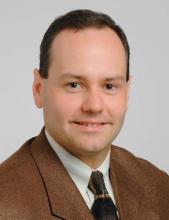MIAMI BEACH – Knowing if immunomodulators should be stopped in the perioperative period and when would be helpful for hospitalists, surgeons, other clinicians and, ultimately, for patients.
It is important to balance the concerns of patient optimization for surgery vs. the risk of triggering a recurrent inflammatory cascade or organ rejection during cessation, Dr. Christopher Whinney said at a meeting on perioperative medicine sponsored by the University of Miami.
Although there is a dearth of randomized controlled trials to address immunomodulator cessation around the time of surgery, Dr. Whinney reviewed what evidence is available (mostly observational and/or retrospective studies). He provided specific advice regarding tumor necrosis factor (TNF) alpha inhibitors, corticosteroids, calcineurin inhibitors, antiproliferative agents such as mycophenolate mofetil, and mammalian target of rapamycin inhibitors (mTOR).
There is some controversy regarding continuation of TNF-alpha inhibitors during the perioperative period, for example, said Dr. Whinney, chairman of the department of hospital medicine at the Cleveland Clinic. "Some studies suggest an increased risk for [surgical site] infection and others do not. The literature is heterogenous in this area."
Continuation of TNF-alpha agents in patients with rheumatoid arthritis, for example, was not associated with increased risk of surgical site infections in a retrospective study of 1,219 surgical procedures performed in 768 patients (J. Rheum. 2007;34:689-95). In contrast, other researchers conducted a systematic literature review and determined there is evidence of an increased risk of serious infection with TNF-alpha inhibitor use, in general, among patients with rheumatoid arthritis (JAMA 2006;295:2275-85).
"It’s a judgment call," Dr. Whinney said. "Although the weight of evidence suggests the safety of continuation ... my practice would be to withhold these 2 weeks preoperatively, of course in discussion with the rheumatologist or person prescribing these agents."
Corticosteroid supplementation in the perioperative setting is another question with no definitive answer in the literature. Whether or not to provide high "stress dose" steroids on the morning of surgery to minimize the potential for an adrenal crisis in patients with adrenal insufficiency is a question. The stress of surgery can activate the brain’s hypothalamic-pituitary-adrenal (HPA) axis and trigger a rare but serious adrenal crisis. The thinking is that high-dose steroids will suppress the HPA axis activation and prevent these rare crises.
"Current supplementation is probably excessive. We probably give way too [many] stress dose steroids ... and are probably treating ourselves more than we are treating our patients," Dr. Whinney said.
A Cochrane database review supports this position (Cochrane Database Syst. Rev. 2009;4:CD005367).Dr. Whinney said this review revealed that for patients on basal steroid doses, "it was not possible to refute or support perioperative steroid supplementation."
"For most patients who are on steroids for a reason other than existing HPA axis disease, for most surgeries, their daily steroid regimen is acceptable."
Other researchers recommended an amount of steroid supplementation to administer according to surgery type: superficial, minor, moderate, or major (Semin. Arthritis Rheum. 2007;36:278-86).
Aminosalicylates are another type of immunomodulator relevant in the perioperative period. These anti-inflammatory agents are taken by patients with ulcerative colitis or Crohn’s disease. There are little data on perioperative use of these agents, which include sulfasalazine or 5-aminosalicylate, Dr. Whinney said.
Some researchers suggest holding aminosalicylates on the day of surgery for patients with inflammatory bowel disease who are renally cleared, if they have a diminished glomerular filtration rate (for example, patients older than 65 years, those with ASA physical status score of 4 or 5, and/or patients with a revised cardiac risk index score greater than 2) (Mayo Clin. Proc. 2011;86:748-57). This protocol permits reinitiating aminosalicylates on postoperative day 3.
Patients also might present for surgery taking one of the potent calcineurin inhibitors such as cyclosporine or tacrolimus. Although there is no evidence of increased postoperative complications when these agents are continued perioperatively, continue to watch patients for infection and continue to monitor drug levels, Dr. Whinney said. He also recommended switching patients to an intravenous form if they are NPO (nothing by mouth) for an extended time or are placed on mechanical ventilation for more than 24 hours. It is important to consult a transplant surgeon regarding these agents.
Azathioprine and 6-mercaptopurine are antiproliferative agents often administered for their steroid sparing effects. There have been no consistent effects on surgical outcomes or mortality reported, Dr. Whinney said. However, it is probably reasonable to hold these agents on the day of surgery and resume on the third postoperative day, mostly to avoid any adverse effect on anesthesia. Have a conversation with the prescribing physician, he added, before you stop these agents perioperatively.


